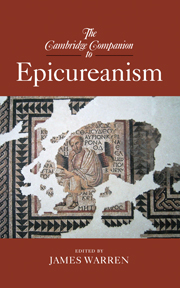Book contents
- Frontmatter
- Introduction
- 1 The Athenian Garden
- 2 Epicureanism in the Roman Republic
- 3 Epicureanism in the Roman Empire
- 4 Epicurean atomism
- 5 Epicurean empiricism
- 6 Cosmology and meteorology
- 7 Psychology
- 8 Action and responsibility
- 9 Pleasure and desire
- 10 Politics and society
- 11 Epicurean philosophy of language
- 12 Philosophia and technē: Epicureans on the arts
- 13 Removing fear
- 14 Epicurean therapeutic strategies
- 15 Epicureanism in early modern philosophy
- Bibliography
- Index
2 - Epicureanism in the Roman Republic
Published online by Cambridge University Press: 28 September 2009
- Frontmatter
- Introduction
- 1 The Athenian Garden
- 2 Epicureanism in the Roman Republic
- 3 Epicureanism in the Roman Empire
- 4 Epicurean atomism
- 5 Epicurean empiricism
- 6 Cosmology and meteorology
- 7 Psychology
- 8 Action and responsibility
- 9 Pleasure and desire
- 10 Politics and society
- 11 Epicurean philosophy of language
- 12 Philosophia and technē: Epicureans on the arts
- 13 Removing fear
- 14 Epicurean therapeutic strategies
- 15 Epicureanism in early modern philosophy
- Bibliography
- Index
Summary
Any account of philosophy in the Roman Republic must start from the events of 155 BC. The city of Athens, appealing to the Roman senate against a fine levied for its sack of Oropus, sent as ambassadors the current heads of three leading philosophy schools - the Academy, Stoa and Peripatos. The excitement generated by these philosophers during their stay in Rome was sufficient to ignite the long Roman love affair with philosophy. Roman patronage became in time a factor that few Greek philosophers could afford to ignore. Many Romans travelled, or sent their sons, to Athens to study in the metropolitan schools. But, conversely, many of the philosophers migrated towards the new centre of power, typically joining the entourage of a powerful Roman. By the mid first century BC, Rome itself had become one of the leading philosophical centres. This shift of the centre of gravity away from Athens was a gradual one, but was intensified by Sulla's crippling siege of Athens during the Mithridatic War, 88-86 BC, a critical period which, for example, saw both contenders for the headship of the Academy move the scene of their operations elsewhere - Philo of Larissa to Rome, Antiochus to Alexandria. The leading Stoic of the first century BC, Posidonius, who was frequently to be found in Rome, did not succeed to the headship of the Stoa in Athens, but eventually set up a school on the island of Rhodes.
- Type
- Chapter
- Information
- The Cambridge Companion to Epicureanism , pp. 29 - 45Publisher: Cambridge University PressPrint publication year: 2009
- 35
- Cited by



